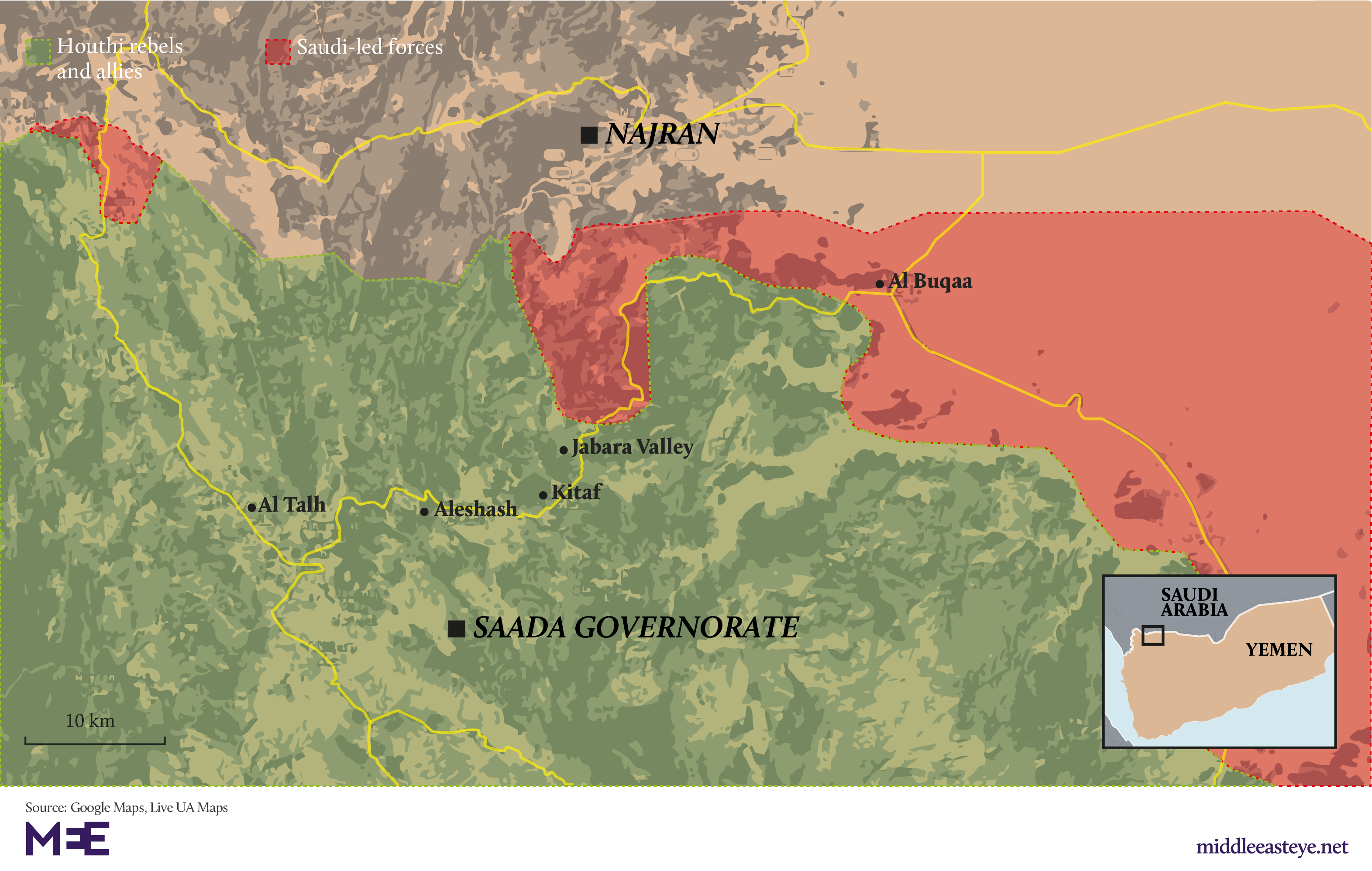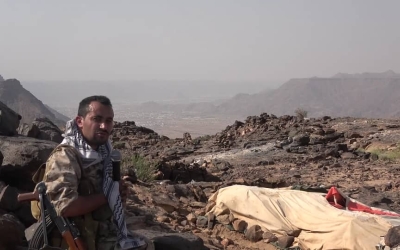'I curse myself': Yemeni mercenaries say their Saudi fighting days are over

As years of war in Yemen flew by, Anees felt he had no choice but to become a mercenary and join a brigade fighting the Houthi rebels.
The plastic factory in Taiz City where he had been working shut down and, without an income, his wife took his daughter and left him with a stark decision.
'I am cursing myself every day for joining the battles with Saudi Arabia to defend its borders from the Houthis'
- Anees, former Yemeni mercenary
“She said I could either provide the family with our basic needs or divorce her,” he told Middle East Eye, speaking on the condition that he could use a pseudonym, as he fears for his safety.
So in October 2018, Anees, following dozens of other men from his village, joined the al-Fateh Brigade, a Saudi-backed fighting force established in 2016, entirely composed of Yemeni fighters and based in the Saudi border town of Najran.
Anees was able to send around $1,200 back to his family each month and continued to fight until this April, when he went home for a visit. In May, he returned to the Saudi-Yemen border once again, even though he sensed it could be his last trip home.
New MEE newsletter: Jerusalem Dispatch
Sign up to get the latest insights and analysis on Israel-Palestine, alongside Turkey Unpacked and other MEE newsletters
"I was feeling that maybe this was my final visit to my village. The battles were getting fiercer and the Saudis were sending us to the front lines while they keep far from the battles," he said.
Four months later - and days after he says Saudi Arabia put more than 1,000 mercenaries like him in a vulnerable position at the kingdom’s border, where they were besieged by the Houthis for four days – the 43-year-old and relatives of those killed during the siege are calling on fighters to desert their paymasters.
“I am cursing myself every day for joining the battles with Saudi Arabia to defend its borders from the Houthis. But it was not only my mistake. It was also the bad economy that made us do it,” he said.
Caught in a trap
In recent months, the Houthis have stepped up cross-border missile and drone attacks on Saudi Arabia, hitting an airport and a major oil field since August.
As fighting in Yemen's south has heated up between secessionists and forces supporting the government of Abd Rabbuh Mansour Hadi, the Houthis have taken advantage of the decreasing numbers of pro-Hadi fighters in the north, with rebels advancing towards the Saudi border.
Last week, Anees said, the leaders of his brigade called on their fighters to march on the Jabara Valley, an area in the Ketaf district of Saada province.
“We know this valley is under Houthi control and that the Houthis were also positioned behind us in Najran,” Anees said.
But the leaders insisted that the mercenaries press forward, promising that Salafi fighters would follow from behind and protect them.
More than 1,000 Yemeni fighters advanced to the valley, which was empty when they arrived, Anees said. They then marched about 1.5km around the valley and still, he said, there were no Houthis in sight. But it was a trap.
“Suddenly, the Houthis started to attack us from the mountains. We tried to withdraw but there were no Salafi fighters backing us up and only the Houthis besieging us from all directions,” he said.
Anees said the siege started on Monday and lasted until Thursday, without any intervention from Saudi Arabia or the Salafis. Eventually, some of the fighters broke through and fled.
“We were about to die from hunger. We had run out of food. The Saudis and the Salafis did not break the siege on us, so we fought and pushed towards Najran and only few were escaped including me,” Anees said.
He said he was among fewer than 100 fighters who escaped the battle, while more than 1,000 were either killed or captured, he said.
Some pro-Hadi Facebook accounts and websites have offered similar accounts of the battle, saying the Houthis besieged the fighters for three days, capturing most of the fighters while killing others.
According to these reports, around 800 fighters from Taiz, 600 from Ibb, 300 from Al-Jawf and 200 from Dhamar province were captured in Ketaf and then the captives were transported to different prisons.
The accounts also stated that one of the vehicles transporting the captured soldiers, which was far from the area where the siege and fighting had happened, was hit by a Saudi air strike, killing and injuring a large number.
Mohammed Al-Boukhaiti, a Houthi leader and member of the Houthis’ Political Council, said on his Facebook account that all the details in the pro-Hadi reports were true.
“There is more dangerous information which we will reveal later. The most important fact in this post is that the aggressive countries [Saudi-led coalition] targeted their own mercenaries," he wrote.
Saudi Arabia has not commented publicly on the battle and did not respond to MEE's request for comment on Tuesday.
“We were about to die from hunger, but Saudi Arabia did not intervene to break the siege with air strikes because the Saudis do not care about us,” Anees said.
“I call on all Yemeni fighters in the Saudi borders to return to their homes and let the Houthis advance on Saudi Arabia and take revenge for the deaths of our fellow fighters."
Sadness in all the houses
The scale of loss from the fighting and siege in the mountains has shaken households across Yemen, particularly in Taiz province, where many of the paid fighters came from.
“I lost 27 friends from my small village in the outskirts of Taiz City and only two fighters from my village could escape,” said Anees, who escaped by fleeing towards Najran and was only making his way back home on Saturday.
'The Saudis launched a war on us and our men lost their jobs because of the war. Then Saudi Arabia opened the door for Yemenis to defend its borders'
- Aisha Sharaf, mother of slain Yemeni fighter
In his village, a member of every household has been killed or captured at the Saudi border since the war started. Surviving family members say they have nothing to do now, but pray for revenge on the Gulf kingdom.
“The Saudis launched a war on us and our men lost their jobs because of the war. Then Saudi Arabia opened the door for Yemenis to defend its borders,” Aisha Sharaf, the mother of a 26-year-old mercenary, told MEE.
“The men and youth had no choice but to fight for Saudi Arabia to get money that enabled them to marry and help their families.”
Her son, Osama, wanted to get married, but couldn’t afford a marriage dowry of around $2,000, so he joined the battles at the Saudi borders in March to earn the money he needed.
“I was not happy that my son was fighting for Saudi Arabia, but I couldn’t help him marry or build his future. So I prayed that Allah would defeat Saudi Arabia that launched the war on Yemenis and made fighting the only way to make money,” she said.
Osama was one of the fighters killed during the siege near the border, news she only learned from Anees.
“I believe that no fighter is sinful and Allah will forgive them but I hope that Allah will take revenge for our sons and men and for all weak people,” she said.
Mercenaries or soldiers?
Reacting to the news of the battle, the Yemeni government responded without clarifying that the Yemeni fighters who were killed were mercenaries, rather than soldiers with the army.
The Yemeni defence ministry reported that vice president Ali Mohsen Saleh phoned General Raddad al-Hashimi, commander of the Ketaf Brigade, on Friday to follow up on military developments and the condition of the fighters.
“Saleh praised heroes’ legendary resilience in fighting Houthi militia in Sa’ada’s Kataf, praying for the dead soldiers and praying for recovery of the injured and wounded,” the ministry’s website said.
Saleh also reportedly “expressed thanks to Saudi brothers” for their efforts to liberate Yemen from the Houthis.
The fugitive fighter Anees accused the government of being “the worst problem in Yemen”.
“We went to the battles through brokers and we received our salaries in Saudi rials. The government doesn’t know anything about us and it is silly to hear that the government says we are soldiers,” Anees said.
“Our government is trapped in Saudi Arabia, so it is normal to see it doing whatever serves Saudi Arabia and not Yemenis.”
Returning home
The battle has also sparked others to call for mercenaries fighting for Saudi Arabia in Yemen to return home.
Soon after the fighting, Sheik Hamoud Al-Mikhlafi, head of the Popular Resistance in Taiz and now based in Turkey, said on his Facebook account: “We call on all fighters of Al-Janad region [Taiz and Ibb provinces] in the southern borders of Saudi Arabia return quickly to the battles in Taiz.”
He said pro-Hadi forces in Taiz were prepared to receive the fighters and together, they could liberate the rest of Taiz province from the Houthis.
Tawfik al-Hamidi, a lawyer and human rights activist who heads the Geneva-based SAM Organization for Rights and Liberties, said on Twitter: “What is happening in the Saudi borders is a violation of domestic laws and international conventions, which prohibit the use of civilians to fight with a state, outside the frameworks of domestic military laws, so as not to protect their future rights as official combatants.”
In a new paper released on Sunday and based on testimony with local monitors, former officers and recruits, SAM reported that Saudi Arabia has taken advantage of the economic situation in Yemen to hire local fighters.
“Thousands of Yemenis, who had to go to fight to defend the Saudi borders, under the pressure of poor humanitarian conditions and killed or injured, were treated by Saudi Arabia as if they did not exist,” the report said.
“Saudi Arabia is buying Yemeni fighters through human trafficking networks that include Saudis and Yemenis, including former officers and officers of the Yemeni army."
Now that Arees is home, he is encouraging other fighters to return, but says he knows it is a difficult ask.
“Many Yemeni fighters in other fronts in the Saudi borders are demanding to return to their cities after they witnessed the treason of Salafis but the Saudis did not allow them to flee the battles,” he said.
Meanwhile, with some of the money he has left from his fighting, he will try to support his family by selling sandwiches at a nearby school.
Editor's note: A pseudonym has been used to protect Anees's identity
This article is available in French on Middle East Eye French edition.
Middle East Eye delivers independent and unrivalled coverage and analysis of the Middle East, North Africa and beyond. To learn more about republishing this content and the associated fees, please fill out this form. More about MEE can be found here.







